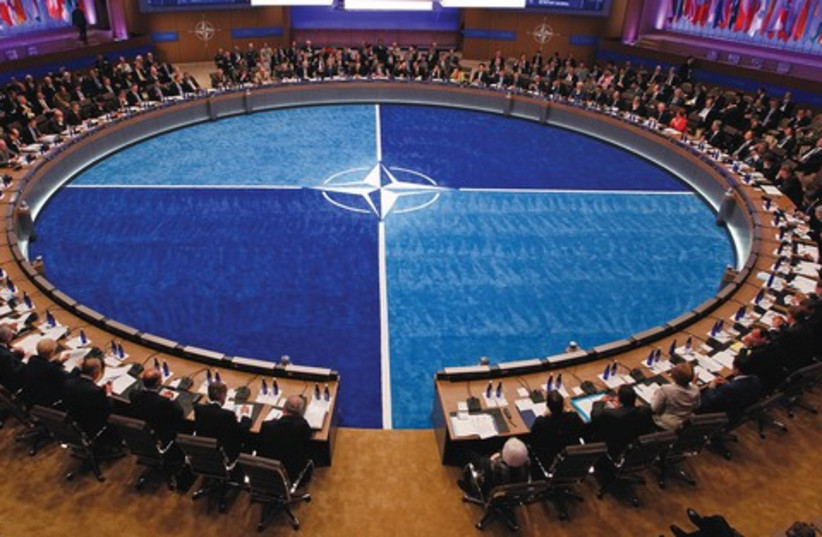WASHINGTON – As tensions between Moscow and Kyiv reach a boiling point, the US and its allies are trying to coordinate their next steps should Russia invade Ukraine.
On Saturday, US President Biden spoke on the phone with Russian President Vladimir Putin, trying to find a diplomatic solution to the crisis. However, the call did not yield any significant progress. US National Security Advisor Jake Sullivan warned in an interview with CBS on Sunday that an invasion could happen “essentially at any time.”
One question that remains open is how the US will respond to a possible invasion. During their call on Sunday, Biden vowed that Russia would pay a price if it invades Ukraine.
“President Biden was clear that if Russia undertakes a further invasion of Ukraine, the United States together with our Allies and partners will respond decisively and impose swift and severe costs on Russia,” the White House said in a readout of the call.
Elliott Abrams, senior fellow for Middle Eastern studies at the Council on Foreign Relations and former US deputy national security advisor, said the Biden administration, like the UK, has made it clear that heavy sanctions would follow any Russian invasion.

“And they will,” he said. “There will be no backing down. Biden believes in NATO, and his word and credibility are at stake here.”
Asked what sanctions were most likely, Abrams said: “Financial sanctions will be the most effective. I would hope to see Russia expelled from SWIFT [Society for Worldwide Interbank Financial Telecommunication]. But even without that, major Russian banks can be banned from the US, UK and other financial systems. Various kinds of transactions can be banned, starting with purchase of Russian oil and gas. Russian assets can be frozen. Here, of course, the main question is Germany, which is so dependent on Russian energy supplies. But I think the pain for Putin will be immediate.”
Dennis Ross, distinguished fellow at the Washington Institute for Near East Policy who served in several US administrations, said if Russia invades, there would be sanctions.
“They will be imposed on Russia’s major banks, meaning any bank internationally will not be able to do business with them,” he said. “They may be excluded from SWIFT, the electronic means for handling all monetary transfers, and the Russian hi-tech sector will suffer from being cut off from semiconductor chips.”
“Russia may respond by dramatically reducing gas shipments to Europe, believing that the Europeans won’t be able to sustain the sanctions in such circumstances,” Ross said. “But that also means Russia loses a major source of its revenues.”
“Will all this happen if it is a limited Russian move? Maybe not to the same extent, but there will still be significant sanctions,” he said. “The question remains, Will Putin decide to go overtly with force. He clearly believes he has an opportunity to rewrite the security architecture in Europe and undo the American rules of the game. But he may also believe he can achieve a great deal without invading Ukraine.”
“Already, he has forced a dialogue on the future security realities in Europe, a dialogue that must take account of Russian interests,” Ross said. “So Putin may already have a lot to point to, but [he] seems to believe he can get more... The question is, Will he overplay his hand, or does he really believe he can get more?... Only he knows his calculus now and whether he will settle for what he has already achieved.”
DAVID R. MARPLES is a distinguished professor of Russian and East European history at the University of Alberta. He is the author of 16 books, including Understanding Ukraine and Belarus (2020) and Ukraine in Conflict (2017).
“If Russia invades Ukrainian territory or bombs one of its cities, then the US will respond with sanctions that could include areas such as trade, banking or personal sanctions on the Russian president, Vladimir Putin,” Marples said. “I do not see any possibility of the US offering no response to a further Russian incursion into Ukraine. Much of Central Europe relies on Russian gas supplies, so the response to sanctions would impact those countries rather than the United States.”
Asked whether there is a diplomatic way to avert an invasion, or is it inevitable, he said: “[Putin] is not interested in talks. The entire crisis is a huge gamble on his part. He created this crisis. There is no danger to Russia from NATO, and there was no need to rehash old grievances given that the last expansion of NATO to Russia’s borders was 18 years ago.”
“That doesn’t mean an invasion is inevitable,” Marples said. “Putin’s main goal is to destabilize Ukraine and its government. Invasion is a very messy way to do that. Concessions on the Donbas, such as the granting of autonomy and some assurance that Ukraine has no chance of joining NATO in the near future, might be enough to dissuade him from anything drastic.
“On the other hand, having assembled such an array of weaponry and a significant number of troops, I am not sure Putin can just send them back to their bases without any obvious gains.”
